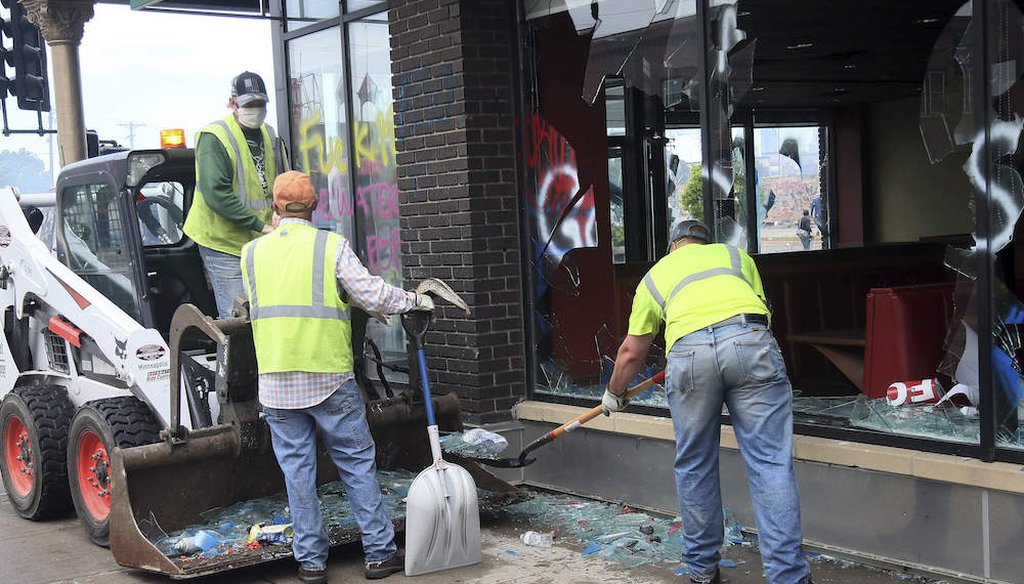Stand up for the facts!
Our only agenda is to publish the truth so you can be an informed participant in democracy.
We need your help.
I would like to contribute

Workers clear broken glasses in front of a building near the Minneapolis Police Third Precinct after a night of rioting as protests continue over the arrest of George Floyd who died in police custody. (AP Photo/Jim Mone)
If Your Time is short
-
Donald Trump warned rioters in Minneapolis that “when the looting starts, the shooting starts.”
-
The phrase dates back to 1967 and a Miami police chief’s stated goal of intimidating African American lawbreakers.
-
The phrase returned in recent years, particularly among gun owners in response to fears of urban unrest.
A day after President Donald Trump signed an executive order targeting Twitter and other social media platforms, Twitter sanctioned his tweet about rioting in Minneapolis over the police killing of George Floyd.
"These THUGS are dishonoring the memory of George Floyd, and I won’t let that happen," Trump tweeted just past midnight on May 29. "Just spoke to Governor Tim Walz and told him that the Military is with him all the way. Any difficulty and we will assume control but, when the looting starts, the shooting starts."
Twitter let the tweet remain, but users would first see a warning: "This Tweet violates our policies regarding the glorification of violence based on the historical context of the last line, its connection to violence, and the risk it could inspire similar actions today."
The blowback grew as the morning unfolded, both against Twitter and against Trump.
Sign up for PolitiFact texts
Trump didn’t coin the phrase. It dates back 50 years.
Whether he knew it or not, the slogan comes out of the very social ill that sparked the protests — police violence aimed at black men. Trump ducked questions from reporters, but about 12 hours after the original tweet, he tried to explain himself.
"Looting leads to shooting, and that's why a man was shot and killed in Minneapolis on Wednesday night," Trump tweeted May 29. "Or look at what just happened in Louisville with 7 people shot. I don't want this to happen, and that's what the expression put out last night means.
That’s not how the slogan came to be.
In 1967, as civil rights protests swept the country, Miami police chief Walter Headley vowed to crack down on young African American men who he said "have taken advantage of the civil rights campaign." There had been a series of robberies in the African American community of Liberty City.
"Felons will learn that they can’t be bonded out from the morgue," Headley said at a December 1967 press conference. "We don't mind being accused of police brutality. They haven't seen anything yet."
Headley added, "We haven't had any serious problems with civil uprising and looting because I've let the word filter down that when the looting starts, the shooting starts."
In his book "Resolving Racial Conflict," Colgate University political scientist Bertram Levine wrote that "a variety of sheriffs and police chiefs" around the country picked up the slogan.
Some conservatives have continued to echo the phrase in more recent years, sometimes repurposing it in the context of potential looting after big storms or other emergencies.
It popped up as recently as April 2020. Conservative activist and actor James Woods — with 2.3 million followers on Twitter — invoked the slogan without saying all of it. Woods was responding to a video message urging Americans not to stockpile firearms during the COVID-19 crisis.
"Thank you for the reminder," Woods tweeted April 9. "When the looting starts, always be prepared. Buy more ammo!"
One of Woods’ followers retweeted him and completed the phrase. Twitter has since deleted that tweet as a violation of its policies.
In September 2018, a Twitter user who sounded more aware of the civil rights era connection posted, "LEFT LOOTERS are drooling waiting for the storm...In Miami, back in the day, there was a saying ‘When the LOOTING STARTS the shooting starts.’ That legal response should be implemented during EVERY storm."
We found an example from August 2017, in response to looting during flooding in Houston.
The threads on Twitter generally come from supportive gun owners. Political scientist Omar Wasow at Princeton University said this is a common pattern.
"Many Americans, particularly those with a heightened concern about tradition and order, purchase guns when they fear the state is no longer providing security," Wasow said. "Race and media are central elements of this."
Garth Pauley, professor of communications at Calvin University, said the phrase, as the Miami police chief made clear, aimed to instill fear in African Americans. Pauley said Trump’s use of the slogan retains that power, "while simultaneously communicating a tough, law-and-order ethos to his supporters."
Our Sources
Donald Trump, tweet, May 29, 2020
Twitter, Response to Donald Trump tweet, May 29, 2020
Donald Trump, tweet, May 29, 2020
Baltimore Sun, Miami police "get tough": Chief is After Negro Felons in Civil Rights Disguise, Dec. 27, 1967
Oath Keepers, tweet, May 29, 2020
Bertram Levine, Resolving Racial Conflict, University of Missouri Press, 2005
Twitter, Phrase usage: Looting starts, accessed May 29, 2020
James Wood tweet, April 9, 2020
Email exchange, Omar Wasow, assistant professor of Politics, Princeton University, May 29, 2020
Email exchange, Garth E. Pauley, professor of Communication, Calvin University, May 29, 2020












































